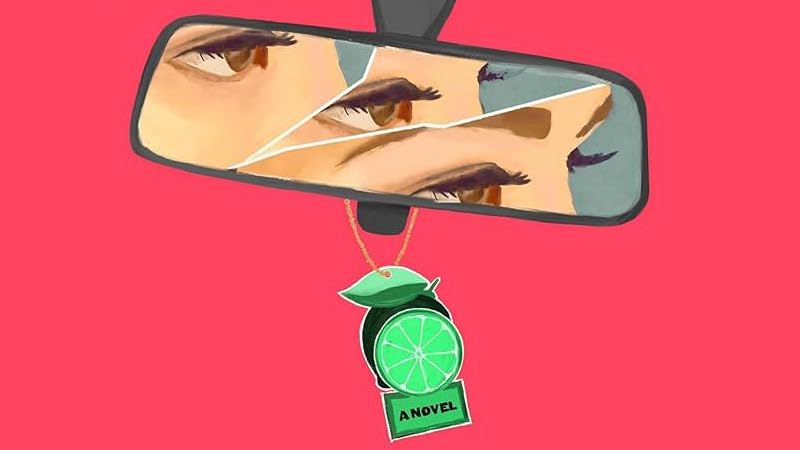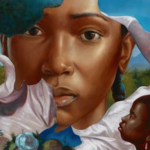In Which Margaret Atwood Annotates Her New Book
The Heart Goes Last Gets the Genius Treatment
Margaret Atwood has annotated this excerpt from her forthcoming novel, The Heart Goes Last, with Genius. Click the yellow highlights to read her annotations.
BREW
It wasn’t a good night. Charmaine did try for a comforting note: “Let’s concentrate on the things we have,” she’d said into the moist, stinky darkness of the car. “We have each other.” She’d started to reach her arm from the back seat into the front, in order to touch Stan, to reassure him, but then she thought better of it. Stan might take it the wrong way, he’d want to get into the back seat with her, he’d want them to make love, and that could be so uncomfortable with the two of them squashed in together because her head would get jammed up against the car door and she’d start to slide sideways off the seat, with Stan working away at her as if she was a job he had to get done really fast, and her head going bump bump bump. It was not inspirational.
Also she can never concentrate, because what if someone snuck up on them from the outside? Stan would be caught bare-assed, scrambling over into the front seat and trying to start the car while a gang of thugs bashed at the windows, trying to get at her. Though not her, first and foremost. What they’d want would be the truly valuable thing, which was the car. She’d be an afterthought, once they’d done away with Stan.
There’s been a number of former car owners flung out onto the gravel, right around here; knifed, heads crushed in, bleeding to death. No one bothers with those cases any more, with finding out who did it, because that would take time, and only rich people can afford to have police. All those things we never appreciated until we didn’t have them, as Grandma Win would say, Charmaine thinks regretfully.
Grandma Win refused to go to the hospital, once she got really sick. She said it would cost too much, and it would have. So she died right in the house, with Charmaine taking care of her up to the end. Sell the house, sugar pie, Grandma Win said when she was still lucid. Go to college, make the most of yourself. You can do it.
And Charmaine had made the most of herself. She’d majored in Gerontology and Play Therapy, because Grandma Win said that way she’d be covered both ends, and she had empathy and a special gift for helping people. She’d got her degree.
Not that it makes any difference now.
*
If anything happens we’re on our own, Stan tells her too frequently. It’s not a comforting thought. No wonder he’s so rapid, those times he does manage to cram himself in on top of her. He needs to be on the alert all the time.
So instead of touching Stan last night, she whispered, “Sleep tight. Love you.”
Stan said something. “Love you too,” maybe, though it came out more like a mumble, with a kind of snort in it. Probably the poor man was almost asleep. He does love her, he said he’d love her forever. She was so grateful when she found him, or when he found her. When they found each other. He was so steady and dependable. She would like to be that way too, steady and dependable, although she has doubts that she can ever manage it because she’s so easily startled. But she needs to toughen up. She needs to show some grit. She doesn’t want to be a drag.
*
They both wake up early—it’s summer now, the light comes in through the car windows, too bright. Maybe she should fix up some curtains, thinks Charmaine. Then they could get more sleep and not be so crabby.
They go for day-old doughnuts at the nearest strip mall, double chocolate glazed, and make some instant coffee in the car with their plug-in cup heater, which is a lot cheaper than buying the coffee in the doughnut place.
“This is like a picnic,” Charmaine says brightly, though it isn’t much like a picnic—eating stale doughnuts inside the car with a light drizzle falling.
Stan checks the job websites on their pre-paid phone, but that’s depressing for him—he keeps saying, “Nothing, fuck, nothing, fuck, nothing”—so Charmaine says why don’t they go jogging? They used to do that when they had their house: get up early, jog before breakfast, then a shower. It made you feel so full of energy, so clean. But Stan looks at her like she’s out of her mind, and she sees that yes, it would be silly, leaving the car unattended with everything in it such as their clothes, and putting themselves at risk in addition, because who knows what might be hiding in the bushes? Anyway, where would they jog? Along the streets with the boarded-up houses? Parks are too dangerous, they’re full of addicts, everyone knows that.
“Jogging, fuck,” is all Stan says. He’s bristly and grumpy, and he could use a haircut. Maybe she can smuggle him into the bar where she works, later, with a towel and a razor, and he can give himself a wash and a shave in the men’s room. Not luxury surroundings, but at least water still comes out of the tap. It’s rusty red in colour, but it comes out.
*
PixelDust is the bar. It opened in the decade when there was a digital mini-boom here—a bunch of interactive startups and app creators—and was meant to lure in those kinds of geeky kids, with toys and games such as foosball and pool and online car racing. There are big flatscreens where they once ran silent movies as cool wallpaper, though one of them is broken and the rest show ordinary TV shows, a different one on every screen. There are some little nooks and corners meant for brainy conversations—Think Tank, that section was called. The signage is still there, though someone’s crossed out Think and written Fuck, because two of the semi-resident hookers turn tricks in there. After the mini-boom dried up, some smarty-pants broke the Pixel part of the LED sign, so now it only says Dust.
By name and by nature, thinks Charmaine: a layer of permanent grime coats everything. The air smells of rancid fat from the chicken wings place next door; customers bring them in here in paper bags, pass them around. Those wings are moderately disgusting, but Charmaine never says no to them when they’re on offer.
The place wouldn’t stay open, except that it’s now the hub for what she supposes—knows, really—is the local clutch of drug dealers. It’s where they meet their suppliers and customers; they don’t need to worry about getting caught, not here, not any more. They have a few hangers-on, plus the two hookers, just high-spirited girls, no more than nineteen. They’re both very pretty; one is a blonde, the other has long dark hair. Sandi and Veronica, decked out in T-shirts with sequins and really short shorts. They were in college before everyone around here lost their money, is what they say.
They won’t last, is Charmaine’s opinion. Either someone will beat them up and they’ll quit, or they’ll give up and start taking those drugs, which is another way of quitting. Or a pimp will move in on them; or one day they’ll just drop through a hole in space and no one will want to mention them, because they’ll be dead. It’s a wonder none of those things have happened yet. Charmaine wants to tell them to get out of here, but where would they go, and anyway it’s none of her business.
When they aren’t busying themselves in the Fuck Tank, they sit at the counter and drink diet sodas and chat with Charmaine. Sandi told her they only do the hooking because they’re waiting to get real work, and Veronica said, “I work my ass off,” and then they both laughed. Sandi would like to be a personal trainer, Veronica would choose nursing. They talk as if these things might really happen one day. Charmaine doesn’t contradict them, because Grandma Win always said miracles really can happen, such as Charmaine coming to stay with her—that was a miracle!
So who knows? Sandi and Veronica have been there a couple of the times that Stan has picked her up from work, and she couldn’t help but introduce them. Out in the car he said, “You shouldn’t get so cozy with those hookers,” and Charmaine said she wasn’t that cozy with them, but they were quite sweet really, and he said, Sweet my ass, which wasn’t very kind in her opinion. But she didn’t say so.
Once in a while outsiders blunder in, young guys usually, tourists from other, more prosperous countries or cities, going slumming, looking for cheap thrills; then she needs to be alert. She’s come to know a lot of the regulars, so they leave her alone—they know she’s not like Sandi and Veronica, she has a husband—and only someone new would think of trying to hit on her.
*
She has the afternoon shift, when it’s pretty quiet. The evening would be better for tips, but Stan says he doesn’t want her working then because there are too many drunken lechers, though he may have to give in on that if she’s offered the slot, because their cash stash is getting really small. In the afternoons it’s only her and Deirdre, who’s left over from the cushier days of PixelDust—she was once a coder, she has a tattoo of a Moebius strip on her arm and still wears her hair in two little-girl brunette pigtails, that Harriet-the-Spy girl-geek look. And there’s also Brad, who does the scowling at the rowdy customers when necessary.
She can watch TV on the flatscreens, old Elvis Presley movies from the sixties, so consoling; or daytime sitcoms, though they aren’t that funny and anyway comedy is so cold and heartless, it makes fun of people’s sadness. She prefers the more dramatic shows where everyone’s getting kidnapped or raped or shut up in a dark hole, and you aren’t supposed to laugh at it. You’re supposed to be upset, the way you’d be if it was happening to you. Being upset is a warmer, close-up feeling, not a chilly distant feeling like laughing at people.
She used to watch a show that wasn’t a sitcom. It was a reality show called The Home Front, with Lucinda Quant. Lucinda used to be a bigtime anchor but then she got older, so The Home Front was only on local cable. Lucinda went around and interviewed people who were being evicted from their homes, and you got to see all their stuff being piled on the lawn, such as their sofa and their bed and their TV, which was really sad but also interesting, all the things they’d bought, and Lucinda asked them what happened to their life, and they told about how hard-working they’d been, but then the plant closed, or the head office relocated, or whatever. Then viewers were supposed to send in money to help those folks out, and sometimes they did, and that showed the good in people.
Charmaine found The Home Front encouraging, because what happened to her and Stan could happen to anyone. But then Lucinda Quant got cancer and went bald and started streaming video of herself being sick, right from her hospital room, and Charmaine found that depressing, so she didn’t watch Lucinda any more. Though she wished her well, and hoped she would get better.
Sometimes she chats with Deirdre. They tell their life stories, and Deirdre’s is worse than Charmaine’s, with fewer kindly adults like Grandma Win, and more molesting, and it has an abortion in it; which isn’t a thing Charmaine could ever bring herself to do. She’s on the pill for now, she gets them cheap from Deirdre, but she’s always wanted a baby, though how she’ll cope if she gets pregnant by mistake, with Stan and her living in their car, she has no idea. Other women—women in the past, tougher women—have dealt with babies in confined spaces, such as ocean ships and covered wagons. But maybe not cars. It’s hard to get smells out of car upholstery, so you’d have to be extra careful about the spitting up and so forth.
*
Around eleven she and Stan have another doughnut. Then they make a hopeful stop at a dumpster out behind a soup joint, but no luck, the stuff has already been picked over. Before noon Stan takes her to the laundromat in one of the malls—they’ve used that one before, two of the machines are still working—and he watches the car while she does a load and then pays for it on their phone. She got rid of their white things a while ago—even her cotton nighties—traded them for darker colours. It’s too hard to keep white things clean, she hates that dingy look. Then they eat some cheese slices and a leftover bagel for lunch, with some more instant coffee. They’ll have better food tonight, because Charmaine gets paid.
Then Stan drops her off at Dust and says he’ll come back at seven to pick her up.
Brad says Deirdre is off, she’s called in sick, but it’s okay because there’s nothing much happening. Just a few guys sitting at the bar drinking a brew or two. They’ve got fancy mixed drinks written up on the chalkboard, but nobody ever buys them.
She settles into the familiar boredom of the afternoon. She’s only had this job for a few weeks, but it feels like longer. Waiting, waiting, waiting, for other people to decide things, for something to happen. It reminds her a lot of the Ruby Slippers Home and Clinic—their motto was “There’s no place like home,” which was kind of sick if you thought about it, since the people were in there because they couldn’t manage in their real homes. Mostly you served the old folks food and drink at intervals, just like at Dust, and were nice to them, just like at Dust, and smiled a lot, just like at Dust. Once in a while she would get in some entertainment, a therapy clown or a therapy dog, or a magician, or a music group donating their time to charity. But mostly nothing much happened, as in those animal-cam websites with baby eagles, until all of a sudden there would be the flurry and crisis of a messy, squawky death. Just like at Dust. Though they don’t beat up anyone inside the building if they can help it.
“Brewski,” says a man at the bar. “Same as before.” Charmaine smiles impersonally and bends over to take the beer out of the fridge. Straightening up, she sees herself in the mirror—she’s still in good shape, not too tired-looking despite the restless night—and catches the man staring at her. She turns her eyes away. Was she teasing, was she flaunting it, bending over like that? No, she was only doing her job. Let him stare.
Last week, Sandi and Veronica asked her if she’d like to turn a few. She could make more that way than she was making behind the bar; way more, if she’d go offsite. They had a couple of rooms nearby they could use, classier than the Fuck Tank, they had beds. Charmaine had a fresh look: the clients liked sweet, big-eyed, kiddie-faced blondes like her.
Oh no, Charmaine said. Oh no, I couldn’t! Though she’d had a tiny flash of excitement, like peering in through a window and seeing another version of herself inside, leading a second life; a more raucous and rewarding second life. At least more rewarding financially, and she’d be doing it for Stan, wouldn’t she? Which would excuse whatever happened. Those things with strange men, different things. What would it be like?
But no, she couldn’t, because it was way too dangerous. You never knew what men like that would do, they could get carried away. They might get started on the self-expression. And what if Stan found out? He’d never go for it, no matter how much they needed the cash. He’d be destroyed. Besides, it was wrong.
From THE HEART GOES LAST. Published in the United States by Nan A. Talese/Doubleday, a division of Penguin Random House LLC, New York, NY. Copyright © 2015 O.W. Toad Ltd. All rights reserved.




















